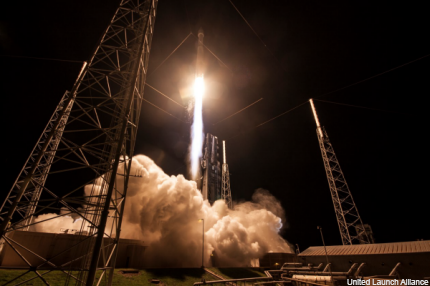ULA, Bezos join forces on new rocket engine
A commercial aerospace venture backed by Amazon.com founder Jeff Bezos will work with the United Launch Alliance to develop a new engine for Atlas and Delta rockets used to launch many military satellites.

ULA currently relies on a Russian-made rocket engine for its launches.
ULA announced Sept. 17 that it would work with Bezos’ privately-backed aerospace venture Blue Origin to develop the BE-4 rocket engine, thereby "addressing the long-term need for a new domestic engine."
ULA has come under fire for relying on the Russian-designed RD-180 engine in its workhorse Atlas V rocket, which is used to launch most Air Force satellites. In a protest of ULA's military launch contracts, SpaceX CEO Elon Musk cited reliance on the Russian engine design while claiming he could deliver an equivalent U.S.-designed capability for less money.
The SpaceX protest was upheld, forcing ULA to come up with a plan to replace the RD-180 engine as U.S. relations with Russia worsen over the tumult in Ukraine. The result is a four-year development deal between ULA and Blue Origin, which is attempting to assemble the technologies needed to reduce the cost of space access while maintaining reliability.
Observers of the emerging commercial space industry caution that this won’t be easy in the unforgiving world of space commerce.
The partners said full-scale testing of the BE-4 engine would commence in 2016. They are targeting 2019 for the first flight. Both companies plan to use the new engine. However, it remains unclear how ULA will fill the gap if and when it runs out of RD-180 engines or access to the Russian technology.
In announcing the deal, ULA CEO Tory Bruno said, “Blue Origin has demonstrated its ability to develop high-performance rocket engines." Added Bezos: "Blue Origin is methodically developing technologies to enable human access to space at dramatically lower cost and increased reliability, and the BE-4 is a big step forward."
The commercial space startup also has deep pockets and may not have to rely as heavily on government contracts as does SpaceX. (SpaceX and Boeing were both selected this week by NASA to begin delivering astronauts to the International Space Station by as early as 2017.)
The BE-4 rocket engine uses liquid oxygen and liquefied natural gas as propellants, generating 550,000 pounds of thrust at sea level. Two engines would be needed for each ULA booster.
By comparison, the SpaceX Falcon 9 "Heavy" rocket that will carry astronauts to the space station will use clusters of Merlin 1D engines that, combined, generate 4 million pounds of thrust. SpaceX claims the Merlin 1D has highest thrust-to-weight ratio of any current liquid-fueled rocket engine.
NEXT STORY: Army launches $49.5 million anti-IED challenge



